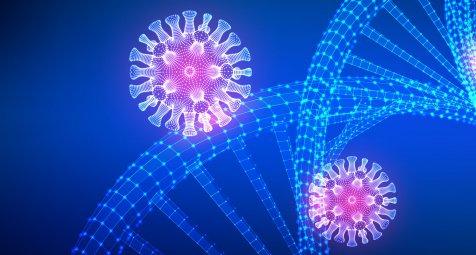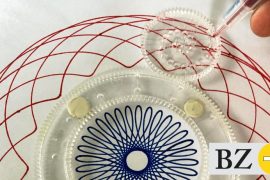/iuriimotov, stock.adobe.com
Berkeley/California – Whether SARS-CoV-2 can infect a cell and how effective its replication is depends not only on the presence of the ACE2 receptor and the protease TMPRSS2.
A systematic study of cell cultures nature genetics (2022; DOI: 10.1038/s41588-022-011131-X) suggests that a variety of factors may influence infectivity and pathogenicity. Mucin molecules can be very important on the cell membrane.
The research team, led by Patrick Hsu of the University of Berkeley, used CRISPR gene scissors to selectively destroy individual genes (“loss of function”) or increase their formation (“gain of function”) in the Calu-3 cell line. used, which arises from the respiratory epithelium of a patient with lung cancer’) to study the effect on the infectivity of SARS-CoV-2.
As expected, intact genes for ACE2 and TMPRSS2 were the most important prerequisites for a successful infection. But a large number of other genes (and proteins or control genes encoded there) also played a role.
For example, on the temporal side, that is, the factors facilitating the replication of SARS-CoV-2 were AP1G1. It encodes a clathrin adapter involved in endocytosis. This is an import mechanism that viruses use to enter cells.
The CHUK gene encodes components of the NF-kB signaling pathway, which affects transcription and thus possibly the conversion of virus genes into proteins. NFE2 also encodes a control gene (transcription factor) and TRAF3IP2 an enzyme that is involved in immune defense but is somehow useful for SARS-CoV-2.
On the antiviral side, the researchers identified several control genes, such as TEAD3 or ZNF275, that inhibit the formation of new viruses in the cell. The cell division promoted by CCNE1 may also make virus replication more difficult.
Physicians should be familiar with the role of mucus. These glycoproteins are a major component of the mucus that coats the epithelium in the airways (and other hollow organs). Earlier genome analysis of intensive care patients had already shown that mucin formation can influence the course of a disease.
Mucin glycoproteins were also a pivotal inhibitory factor for SARS-CoV-2 in Calu-3 cell cultures. In particular the mucosa, which is firmly anchored to the cells, appears to be a barrier to SARS-CoV-2 and its variants.
If mucins are eliminated enzymatically, the virus has “free rein” and infectivity increases significantly. This applied not only to SARS-CoV-2, but also to other respiratory pathogens, although the results here were inconclusive. In some viruses, mucins also appear to facilitate infection of cells.
This also applies to mucins released from epithelia into the environment. They have also partially helped in transmission of SARS-CoV-2. rme/aerzteblatt.de

Web guru. Amateur thinker. Unapologetic problem solver. Zombie expert. Hipster-friendly travel geek. Social mediaholic.





